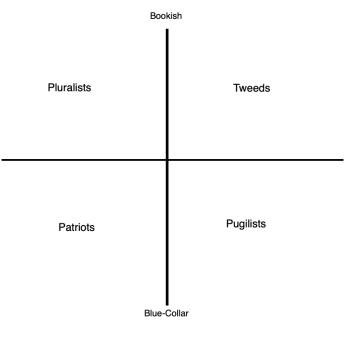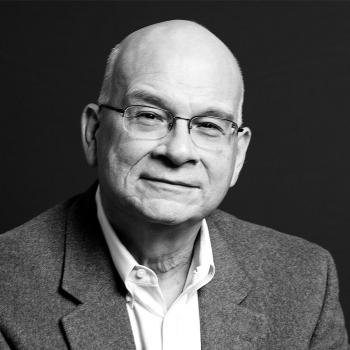 Last year, I published an article over at American Reformer that got a decent amount of buzz. In that piece, I critiqued a number of books—including historian Kristin Kobes du Mez’s Jesus and John Wayne, and sociologists Andrew Whitehead and Samuel Perry’s Taking Back America for God—that broadly purport to be “objective” and “academic” analyses of contemporary evangelicalism, while nonetheless embedding certain value judgments that have a distinctly theological significance. In other words, I argued there that what passes today for “history” and “sociology” often isn’t “neutral,” but rather is profoundly value-laden.
Last year, I published an article over at American Reformer that got a decent amount of buzz. In that piece, I critiqued a number of books—including historian Kristin Kobes du Mez’s Jesus and John Wayne, and sociologists Andrew Whitehead and Samuel Perry’s Taking Back America for God—that broadly purport to be “objective” and “academic” analyses of contemporary evangelicalism, while nonetheless embedding certain value judgments that have a distinctly theological significance. In other words, I argued there that what passes today for “history” and “sociology” often isn’t “neutral,” but rather is profoundly value-laden.
Ever since then, I’ve detected that the debate over these books—let’s take Jesus and John Wayne as the exemplar case—has become increasingly “meta,” in that at issue now are the built-in normative commitments of the disciplines of history and theology as such. If those normative commitments are irreconcilable, then that would seem to be the end of the matter: much of modern social science treats power relations as such as intrinsically suspect, while orthodox theology traditionally has not.
I still think that’s the right set of questions to be asking, but I wonder whether, perhaps, there’s a way for the debate to move beyond this impasse.
Let me begin by tracing the analytical structure of how this set of debates has played out, by going back to the very beginning of the “conversation”:
- Traditional ideas about masculinity and femininity, and about their respective roles, exist. [Representative text: Aristotle’s Politics.]
- Mass culture becomes increasingly secular and increasingly unlikely to look to the Western/Christian tradition as a moral compass, preferring instead to emphasize various other social theories and rights-claims. Where gender is concerned, this looks like the rise of second- and third-wave feminism. [Representative text: Betty Friedan’s The Feminine Mystique.]
- “Evangelicalism,” to the extent such a unified movement exists, reacts against mass culture’s new approach by criticizing its premises on theological grounds and putting forward its own ideas of sex and gender. [Representative text: John Piper and Wayne Grudem’s Recovering Biblical Manhood and Womanhood.]
- Evangelicalism’s account of gender politics—which is itself a critique of a critique—is critiqued on the grounds that, from a historical/sociological perspective, it reinforces the power of white men and is hence suspect. This is a critique of a critique of a critique. [Representative text: Jesus and John Wayne.]
- The historical/sociological critique of evangelicalism’s gender politics is itself critiqued on the grounds that history and sociology are not neutral disciplines, but inscribe their own normative commitments in the act of evaluation. This stage can also be characterized as “disciplinary autocritique,” or putting the premises of a field into question as themselves intrinsically value-laden. [Representative text: my article “The Embarrassment Reflex: Evangelicals and Culture.”]
If you’re counting, this is now a critique (me) of a critique (du Mez) of a critique (evangelicalism writ large) of a critique (modern gender theory). We’re four levels of recursion out from the original Aristotelian claim about sex and gender.
So where do we go from here? Are we doomed to just assert competing truth-claims based on incompatible intra-disciplinary premises?
That’s the exact question at the heart of Jason Ānanda Josephson Storm’s recent book Metamodernism: The Future of Theory, which came to mind in light of a recent symposium on the volume in the Davenant Institute’s journal Ad Fontes. Metamodernism traces the course of the path I’ve outlined above, which (broadly speaking) isn’t a trajectory unique to any particular discipline. It’s become clear in recent years that the social sciences in particular, given the instability of the concepts they tend to work with, have developed a nasty tendency to cannibalize themselves through autocritique—a tendency that puts into question their claim to generate “knowledge” in any meaningful sense.
In response, Metamodernism sketches a proposal for a better way of talking about “social” phenomena (such as Christian manhood or Christian womanhood, as distinguished from natural phenomena like atoms and trees). Let’s take this as our example case. Specifically, rather than trying to give a single catch-all definition of a “social kind” (something like Christian manhood) that can be picked apart by positing endless exceptions, Josephson Storm argues for a focus on dynamic “property-clusters” that are “anchored” by the causal processes that give rise to them. (111) (I would hasten to add here that commitment to the view that sex differences derive ultimately from God’s creation order—natural phenomena—need not keep us from thinking about the ways in which that difference has been conceived, defended, and navigated over time by human beings.)
Here (I think) is what Josephson Storm’s model looks like in practice. As far as Christian manhood is concerned, I would venture that some of the relevant properties include standing firm in the faith (1 Corinthians 16:13–14), providing for one’s household (1 Timothy 5:8), training one’s child in wisdom (Proverbs 4:10–15), and self-sacrificial love for one’s wife (Ephesians 5:25). These properties, when “clustered together,” get at what is meant by Christian manhood.
And in a further sense, Josephson Storm would probably argue, the properties of this cluster-kind Christian manhood “emerge via [its] relationship to other social kinds” such as Christian womanhood. So, for instance, the expectation that a Christian man sacrifice his life for his wife in a situation of risk is defined against the assumption that a Christian woman need not make such a sacrifice, and this assumption is in turn partly constitutive of the property-cluster Christian womanhood.
The specific modes of causal anchoring in which I’d ground these property-clusters are what Josephson Storm describes as ergonic convergence, or “a process of selection or design intended to fulfill a certain function,” (123) and etiological processes, or the anchoring of categories “which gain their membership from point of origin or recognizable descent.” (126) By this, I mean simply that (1) God created men purposively, and (2) these clustered properties find their point of origin in the Scriptural text.
And here we grasp a difference between the position I’ve sketched and the one that emerges in Jesus and John Wayne. I suspect du Mez would suggest that the relevant anchoring processes aren’t ergonic convergence or etiological processes, but rather what Josephson Storm calls dynamic-nominalist processes, or “role adoption or enforcement processes to stabilize the cluster of [properties].” (120) That is to say, on her account it’s largely the patriarchal values in a historically male-dominated culture, rather than a specific “process of . . . design” or “point of origin,” that have given rise to what passes for Christian manhood today. And with that, the central point of disagreement is now teed up cleanly, allowing for genuine engagement rather than pressing interlocutors toward questioning one another’s motives.
To be clear, vastly more work would need to be done to flesh out this analytical skeleton or apply it to other contexts. But perhaps something along the lines of this paradigm could help us learn to talk about contested, theologically charged concepts in a more open and honest way—one that gets past some of the frustrating argumentative tics of contemporary social theory.















